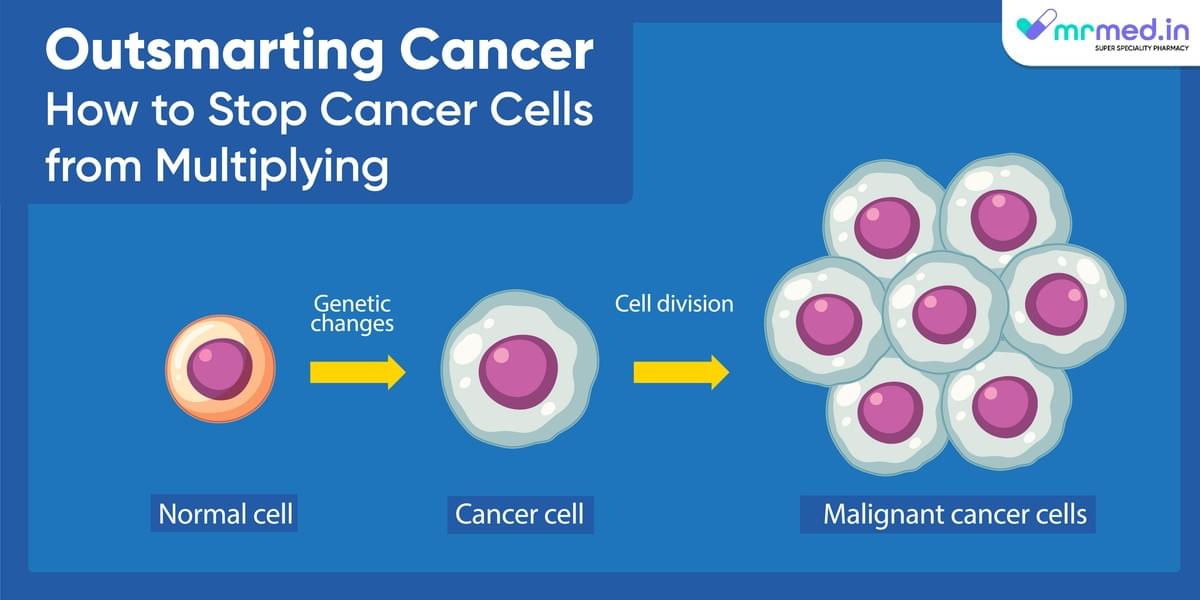Cancer is a complex and often devastating disease characterised by the uncontrolled growth and division of abnormal cells. This malignant growth can lead to tumours and spread to other parts of the body, a process known as metastasis. To effectively combat cancer, it is crucial to understand the mechanisms behind the multiplication of cancer cells and to implement strategies that can help prevent and treat this disease.

In normal cells, the cell cycle is tightly regulated to ensure proper growth, replication, and division. However, in cancer cells, these regulatory mechanisms are often disrupted, allowing the cells to divide uncontrollably. This dysregulation can result from genetic mutations that alter the function of proteins responsible for cell cycle control. Targeting these disruptions is a key focus of cancer therapies, which aim to restore normal cell cycle regulation and prevent tumour growth.
What is the game changer for cancer treatment?
Targeted therapies represent a significant advancement in cancer treatment. Unlike traditional chemotherapy, which affects both cancerous and healthy cells, targeted therapies specifically attack cancer cells based on their genetic makeup or the proteins they express.
Mabtas N 500mg Injection, containing Rituximab, is an example of a targeted therapy used to treat certain types of cancer, such as non-Hodgkin's lymphoma and chronic lymphocytic leukaemia. Rituximab works by binding to the CD20 protein on the surface of B-cells, leading to their destruction by the immune system. This targeted approach minimises damage to normal cells and reduces side effects.
What are the foods to eat and avoid to stop cancer cell multiplication?
- Processed Meats: Consumption of processed meats, such as sausages, bacon, and hot dogs, has been linked to an increased risk of colorectal cancer. These products often contain preservatives like nitrates and nitrites, which can form carcinogenic compounds in the body. Limiting or avoiding processed meats can reduce exposure to these harmful substances and lower cancer risk.
- Red Meat: High consumption of red meat, particularly when cooked at high temperatures, can increase the risk of certain cancers, including colorectal cancer. This risk is partly due to the formation of carcinogenic compounds during cooking, as well as the presence of heme iron, which can promote the formation of harmful free radicals. Substituting red meat with leaner protein sources, such as poultry, fish, or plant-based proteins, can be a healthier choice.
- Sugary Foods: Diets high in refined sugars and sugary foods can contribute to obesity, which is a risk factor for several types of cancer. Additionally, excessive sugar intake can lead to insulin resistance and chronic inflammation, both of which are associated with cancer development. Reducing the consumption of sugary foods and beverages can help maintain a healthy weight and reduce cancer risk.
- Alcohol: Alcohol consumption is a known risk factor for several cancers, including liver, breast, and oesophagal cancers. Alcohol can act as a carcinogen by damaging DNA, promoting oxidative stress, and impairing the body's ability to metabolise certain nutrients. Limiting alcohol intake or abstaining altogether can significantly reduce cancer risk.
- Fried Foods: Foods fried at high temperatures, particularly those high in unhealthy fats, can contribute to inflammation and increase the risk of cancer. The frying process can lead to the formation of acrylamide, a potential carcinogen found in foods like French fries and potato chips. Choosing healthier cooking methods, such as baking, steaming, or grilling, can reduce the intake of harmful substances.
Foods to Include
- Fruits and Vegetables: A diet rich in fruits and vegetables provides essential vitamins, minerals, and antioxidants that can help protect against cancer. Antioxidants neutralise free radicals, which can damage cells and contribute to cancer development. Specific fruits and vegetables, such as berries, cruciferous vegetables (like broccoli and cauliflower), and leafy greens, are particularly high in cancer-fighting compounds.
- Whole Grains: Whole grains, such as brown rice, oats, quinoa, and whole wheat, are excellent sources of fibre, which is important for maintaining digestive health and reducing cancer risk. Fiber helps regulate bowel movements, lowers cholesterol levels, and supports a healthy gut microbiome. A diet high in fibre can reduce the risk of colorectal cancer and other gastrointestinal cancers.
- Nuts and Seeds: Nuts and seeds are nutrient-dense foods that provide healthy fats, protein, fibre, and various vitamins and minerals. They contain compounds like phytosterols and antioxidants that have anti-inflammatory and anticancer properties. Incorporating a variety of nuts and seeds into your diet can support overall health and reduce cancer risk.
- Green Tea: Green tea is rich in polyphenols, particularly catechins, which have been shown to have anticancer properties. Regular consumption of green tea has been associated with a reduced risk of several cancers, including breast, prostate, and colorectal cancers. Drinking green tea as part of a balanced diet can provide additional health benefits.
- Omega-3 Rich Foods: Omega-3 fatty acids, found in fatty fish like salmon, mackerel, and sardines, as well as in flaxseeds and walnuts, have anti-inflammatory properties that can help reduce cancer risk. These healthy fats also support heart health and brain function. Including omega-3-rich foods in your diet can provide a range of health benefits and support cancer prevention efforts.
Cancer prevention and treatment require a multifaceted approach that includes medical interventions, dietary changes, and lifestyle modifications.
Additionally, making informed dietary choices and adopting healthy lifestyle habits can play a significant role in preventing cancer and promoting overall well-being. It is important to consult with healthcare professionals to develop a personalised cancer prevention and treatment plan that meets your specific needs.
